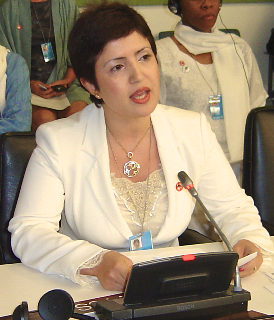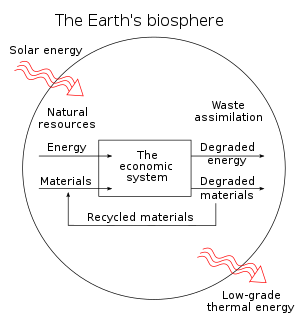Ein Zitat von Wangari Maathai
Die wesentliche Rolle der Umwelt spielt in Diskussionen über Armut immer noch eine untergeordnete Rolle. Während wir diese Initiativen weiterhin diskutieren, beschleunigt sich die Umweltzerstörung, einschließlich des Verlusts der Artenvielfalt und des Mutterbodens, was dazu führt, dass die Entwicklungsbemühungen ins Stocken geraten.
Themen zitieren
Über
die biologische Vielfalt,
die
die Debatte
fortsetzt , die Degradation,
die Entwicklung
Diskussionen
, die Bemühungen
, die Umwelt
, die Umwelt,
die Umweltdegradation
die wesentliche
Stockung,
einschließlich
der Initiativen,
den Verlust
der marginalen
Armut,
die Rolle,
immer noch
Mutterboden
, während
Verwandte Zitate
Zu lange hat die Entwicklungsdebatte die Tatsache außer Acht gelassen, dass Armut nicht nur durch materielle Unzulänglichkeit, sondern auch durch die Verweigerung von Rechten gekennzeichnet ist. Was benötigt wird, ist ein auf Rechten basierender Entwicklungsansatz. Die Grundlage für die Politik ist die Gewährleistung wesentlicher politischer, wirtschaftlicher und sozialer Ansprüche sowie der Menschenwürde für alle Menschen. Dabei handelt es sich nicht um einen Luxus, den sich nur die Reichen und Mächtigen leisten können, sondern um einen unverzichtbaren Bestandteil der nationalen Entwicklungsbemühungen.
Mangelnde Rechenschaftspflicht schwächt die Umwelt- und Gesundheitsrechte der Bürger; es schadet Initiativen zur Friedenskonsolidierung und Versöhnung; behindert die Umsetzung globaler Gesundheitspolitik; führt zum Verlust von Ökosystemen und Artenvielfalt; und schwächt Demokratie, Gerechtigkeit, Menschenrechte und internationale Sicherheit.
Es gibt wirksamere Möglichkeiten zur Bewältigung von Umweltproblemen wie der globalen Erwärmung, der zunehmenden Verbreitung von Kunststoffen, der Zersiedelung der Städte und dem Verlust der biologischen Vielfalt als durch Verträge, Top-Down-Regulierungen und andere Ansätze, die von großen Regierungen und ihren Angehörigen angeboten werden.
Es gibt wirksamere Möglichkeiten zur Bewältigung von Umweltproblemen – einschließlich der globalen Erwärmung, der zunehmenden Verbreitung von Kunststoffen, der Zersiedelung der Städte und dem Verlust der Artenvielfalt – als durch Verträge, Top-Down-Regulierungen und andere Ansätze, die von großen Regierungen und ihren Angehörigen angeboten werden.
Die Umweltwissenschaft verrät uns viel über unsere Zukunft und wie sie aussehen könnte, ob wir nun über die globale Erwärmung (das aktuelle Aushängeschild der Umwelt) sprechen, über einen Verlust der genetischen Vielfalt in unserer Nahrungsversorgung oder über die Auswirkungen niedriger Temperaturen -Dosierung von Chemikalien auf die menschliche Entwicklung.
Selbst wenn wir aus der Krise herauswachsen und die unvermeidliche und schmerzhafte Versöhnung von virtuellem und realem Reichtum hinauszögern könnten, stellt sich die Frage, ob dies eine kluge Entscheidung wäre. Die Grenzkosten zusätzlichen Wachstums in reichen Ländern, wie etwa die globale Erwärmung, der Verlust der biologischen Vielfalt und verstopfte Straßen mit Autos, übersteigen mittlerweile wahrscheinlich den Grenznutzen eines kleinen Mehrkonsums. Das Endergebnis ist, dass die Förderung weiteren Wirtschaftswachstums uns ärmer und nicht reicher macht.
Jedes zweite Wort aus jedem anderen chinesischen Mund ist „Entwicklung, Entwicklung, Entwicklung, Entwicklung“. Und das ist es, worüber sie reden – weil sie glauben, dass es ihnen erstens mit der Entwicklung ermöglicht, den Status zu erreichen, den sie sich in der Welt wünschen, und zweitens, dass es ihnen ermöglicht, mit ihren inneren Problemen umzugehen, wenn sie müssen mit Armut, Stadt-Land und der Umwelt zu tun haben.
In einer Welt, in der Millionen Menschen in extremer Armut leben, an Unterernährung sterben und keine medizinische Versorgung haben und in der Pandemien weiterhin töten, ist es unerlässlich, in gutem Glauben Abrüstungsverhandlungen zu führen und die Budgets weg von Waffenproduktion, Kriegstreiberei und Überwachung zu verlagern von Privatpersonen und stellen die verfügbaren Ressourcen für die Bewältigung globaler Herausforderungen bereit, darunter humanitäre Hilfe, Umweltschutz, Eindämmung und Anpassung an den Klimawandel, Prävention von Pandemien und die Entwicklung einer grünen Wirtschaft.



































